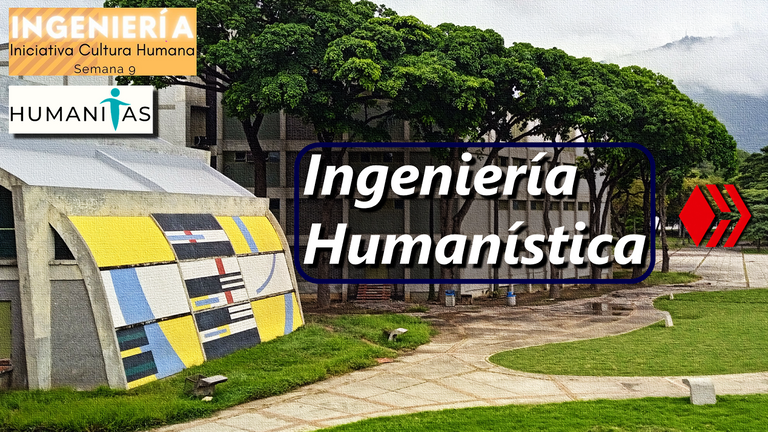Esta semana tocamos un tema muy especial para mi ya que mezclamos dos áreas que aparentemente no tienen nada que ver y una de ellas es mi profesión: la ingeniería. La otra área es obviamente las humanidades, el nicho de esta comunidad #Humanitas.
Este es el enlace de la iniciativa: Iniciativa: Cultura Humana semana 9: Ingeniería. En la comunidad Humanitas.
Como ingeniero espero traer un punto de vista al respecto que remarque la importancia de las humanidades en esta disciplina. Abordaremos algunos puntos interesantes acerca de la relación entre ingeniería y las humanidades.

Experiencia como Estudiante de Ingeniería
A lo largo de mis estudios universitarios en Ingeniería Civil tuve la oportunidad de cursar algunas asignaturas relacionadas al área de Humanidades. Introducción a la Ingeniería, una asignatura de primer semestre, aborda algunos aspectos humanísticos de la ingeniería. Aún recuerdo estar leyendo un poco de autores como Thomas Kuhn y su texto sobre las revoluciones científicas y cambios de paradigma. De igual forma recuerdo haber leído algunos otros autores que honestamente no recuerdo. Y es que aunque es una buena introducción a la ingeniería desde el ámbito de humanidades, en el primer semestre muchos son muy jóvenes aún para adquirir un gusto por las humanidades, y más aún con una educación secundaria deficiente y la exigencia de las otras materias de ingeniería como Cálculo, Geometría Descriptiva y Física.
Algo similar sucedió semestres después con una asignatura llamada "Ingeniería y Sociedad". Esta era una asignatura electiva socio-humanística, es decir, no es obligatoria sino que es una opción a escoger entre varias materias humanísticas. Fue una materia muy interesante, pero el estudiante de ingeniería tiene poco tiempo para leer con tantos exámenes, proyectos y cálculos de por medio que requieren muchas horas de práctica. Quizás lo mejor sería introducir las humanidades a la ingeniería de una forma más práctica, de manera que el estudiante sienta luego mayor interés por la teoría.
Otro aspecto, quizás a modo de crítica, es que asignaturas como "Inglés" cuenten como materias socio-humanísticas. Es decir, a mi modo de ver, aprender un idioma nuevo desde el punto de vista técnico-gramatical no es algo muy "humanístico" que digamos. Pasé toda mi carrera escuchando y leyendo nombres como Descartes, Pascal, Newton, Bernoulli, Leibniz, etc., en infinidad de cálculos, esquemas, diagramas y más, pero hubiera sido más interesante conocer su lado humanístico, lo que escribieron más allá de los números y ecuaciones.

También podríamos mencionar materias propias del ámbito ingenieril que tienen su fundamento en algo más humanístico. Cuando hablamos de "Hidráulica" hablamos de cálculos y ecuaciones abstractas sobre tuberías, canales, flujos, etc. Pero cuando hablamos de "Sistemas de Abastecimiento", empezamos a adentrarnos en proyectos cuyo objetivo es emplear todos esos cálculos abstractos para que cierta cantidad de personas, que viven de cierta forma, ya sea en edificios o casas, puedan recibir al menos una cantidad de agua mínima para vivir de acuerdo a Normativas públicas.
Esos cálculos son orientados a resolver problemas que aquejan al ser humano. Y de igual manera, muchas otras materias de final de la carrera abordan proyectos cuya finalidad es utilizar el ingenio y los cálculos para resolver un problema en la sociedad.
El problema es quizás que no solo haría falta una especie de mayor integración con las humanidades, desde el punto de vista práctico, sino que en general el mundo moderno valora más lo técnico sobre lo humanístico. Son más llamativas esas carreras que aparentemente generan más dinero. Y en parte, ha hecho que nos volvamos un poco ciegos sobre lo que el ser humano realmente necesita.
Ingeniería Social o... ¿Humanística?


Lo que un ingeniero hace es crear una solución que resuelva un problema o necesidad de la sociedad, ya sea proyectar más viviendas, un puente que conecte dos poblados o una App que ayude a ciertas personas con cierta discapacidad. Pero también podría pensarse que alguien con mucho ingenio o "sabiduría", en una posición de poder, podría efectuar cambios en la sociedad que esta no necesita pero supuestamente llevarían a un mejor futuro.
En cierto sentido podría ser válido alentar cierto cambio en la sociedad para evitar un mal futuro, pero cuando se lleva a niveles extremos esto puede tener efectos muy negativos. Muchos de los regímenes más oscuros de la humanidad han llegado a grandes niveles de ingeniería social, en los cuales se plantea el diseño o modificación de la sociedad mediante la fuerza, siguiendo fines poco humanísticos.
Y es que el ser humano, es decir, las personas, no puede ser tratado como una pieza o engranaje en una maquinaria. Acabo de mencionar el caso de regímenes, pero también podríamos trasladarnos al caso de tecnologías cada vez más adictivas como las redes sociales. Si bien el entretenimiento y la comunicación son necesidades del ser humano, puede que el propósito se desvirtúe si el objetivo es hacernos dependientes.
Hace poco vi un video de la plataforma Platzi en el cual se mencionaba el grave problema que existe actualmente con la tecnología, las redes sociales y el creciente fenómeno de la soledad en el mundo. Es algo que desde hace un tiempo he venido notando, y es que casi sin darnos cuenta, la tecnología ha cambiado nuestra vida social de maneras no necesariamente positivas.
Tal como se menciona en el video, la tecnología ha avanzado de manera muy rápida en los últimos 20 años, por lo que no hemos tenido tiempo de adaptarnos. Estaríamos entonces en una especie de "transición", en donde vamos poco a poco adaptándonos a algo que nos está haciendo daño actualmente.
La idea sería entonces que el ingenio humano esté a favor del ser humano. Quizás el término "Ingeniería Social" no suene tan mal, y es que incluso podría decirse que las leyes para prohibir crímenes son una forma de ingeniería social, pero quizás el término más adecuado que debemos buscar es la "Ingeniería Humanística".
Es un reto para la humanidad de los próximos años, integrar el conocimiento humanístico a la tecnología, y así evitar que suceda algo similar a la película "Matrix", en donde las máquinas, sin consciencia, dominan al ser humano. Es utilizar la ingeniería de forma consciente.
Espero que hayas disfrutado de esta lectura. Invito a participar a algunos ingenieros y científicos que hay en #Hive tales como @hannymarchan @emiliomoron @canelarecetas @mafalda2018 @slwzl @gorayii
English version
This week we touch a very special topic for me as we mix two areas that apparently have nothing to do and one of them is my profession: engineering. The other area is obviously humanities, the niche of this #Humanitas community.
This is the link to the initiative: Initiative: Human Culture week 9: Engineering. In the Humanitas community.
As an engineer I hope to bring a point of view on this subject that highlights the importance of the humanities in this discipline. We will address some interesting points about the relationship between engineering and the humanities.

Experience as an Engineering Student
Throughout my university studies in Civil Engineering I had the opportunity to take some classes related to the area of Humanities. Introduction to Engineering, a first semester course, deals with some humanistic aspects of engineering. I still remember reading a bit of authors like Thomas Kuhn and his text on scientific revolutions and paradigm shifts. I also remember reading some other authors that I honestly do not remember. And although it is a good introduction to engineering from the humanities, in the first semester many are still too young to acquire a taste for the humanities, and even more so with a poor secondary education and the demands of the other engineering subjects such as Calculus, Descriptive Geometry and Physics.
Something similar happened semesters later with a subject called "Engineering and Society". This was a socio-humanistic elective, i.e., it is not compulsory but an option to choose among several humanistic subjects. It was a very interesting subject, but the engineering student has little time to read with so many exams, projects and calculations in between that require many hours of practice. Perhaps it would be better to introduce the humanities to engineering in a more practical way, so that the student then feels more interest in the theory.
Another aspect, perhaps by way of criticism, is that subjects such as "English" count as socio-humanistic subjects. In my opinion, learning a new language from a technical-grammatical point of view is not very "humanistic". I spent my whole career listening and reading names like Descartes, Pascal, Newton, Bernoulli, Leibniz, etc., in countless calculations, schemes, diagrams and more, but it would have been more interesting to know their humanistic side, what they wrote beyond numbers and equations.

We could also mention engineering subjects that are based on something more humanistic. When we talk about "Hydraulics" we talk about abstract calculations and equations about pipes, channels, flows, etc. But when we talk about "Supply Systems", we start to get into projects whose objective is to use all those abstract calculations so that a certain number of people, who live in a certain way, either in buildings or houses, can receive at least a minimum amount of water to live according to public regulations.
These calculations are oriented to solve problems that afflict the human being. And in the same way, many other end-of-course subjects deal with projects whose purpose is to use ingenuity and calculations to solve a problem in society.
The problem is perhaps that not only would there be a need for a kind of greater integration with the humanities, from a practical point of view, but in general the modern world values the technical over the humanistic. Those careers that apparently generate more money are more attractive. And in part, it has made us a bit blind to what human beings really need.
Social Engineering or... Humanistic?


What an engineer does is create a solution that solves a problem or need in society, whether it's designing more housing, a bridge that connects two towns, or an App that helps certain people with certain disabilities. But it could also be thought that someone with a lot of ingenuity or "wisdom", in a position of power, could effect changes in society that society does not need but would supposedly lead to a better future.
In a sense it might be valid to encourage some change in society to avoid a bad future, but when taken to extreme levels this can have very negative effects. Many of the darkest regimes of humanity have reached great levels of social engineering, in which the design or modification of society is proposed by force, following little humanistic purposes.
And the human being, that is, people, cannot be treated as a piece or gear in a machine. I have just mentioned the case of regimes, but we could also move to the case of increasingly addictive technologies such as social networks. While entertainment and communication are human needs, the purpose may be defeated if the goal is to make us dependent.
I recently saw a video from the Platzi platform in which the serious problem that currently exists with technology, social networks and the growing phenomenon of loneliness in the world was mentioned. It is something that I have been noticing for some time now, and that is that almost without realizing it, technology has changed our social life in ways that are not necessarily positive.
As mentioned in the video, technology has advanced very quickly in the last 20 years, so we have not had time to adapt. We would then be in a kind of "transition", where we are slowly adapting to something that is currently hurting us.
The idea would then be that human ingenuity is in favor of the human being. Perhaps the term "Social Engineering" does not sound so bad, and it could even be said that laws to prohibit crimes are a form of social engineering, but perhaps the most appropriate term to look for is "Humanistic Engineering".
It is a challenge for humanity in the coming years, to integrate humanistic knowledge to technology, and thus avoid something similar to the movie "Matrix", where machines, without conscience, dominate human beings. It is to use engineering in a conscious way.
I hope you enjoyed this reading. Leave your comment or opinion.
Translated to English language with the help of DeepL.com
Otras redes sociales:
 |
 |
 |
 |
F1 & motorsports: @acontmotor
 |
 |
 |
 |
| ¡Gracias por visitar! — ¡Thanks for visiting!  |

